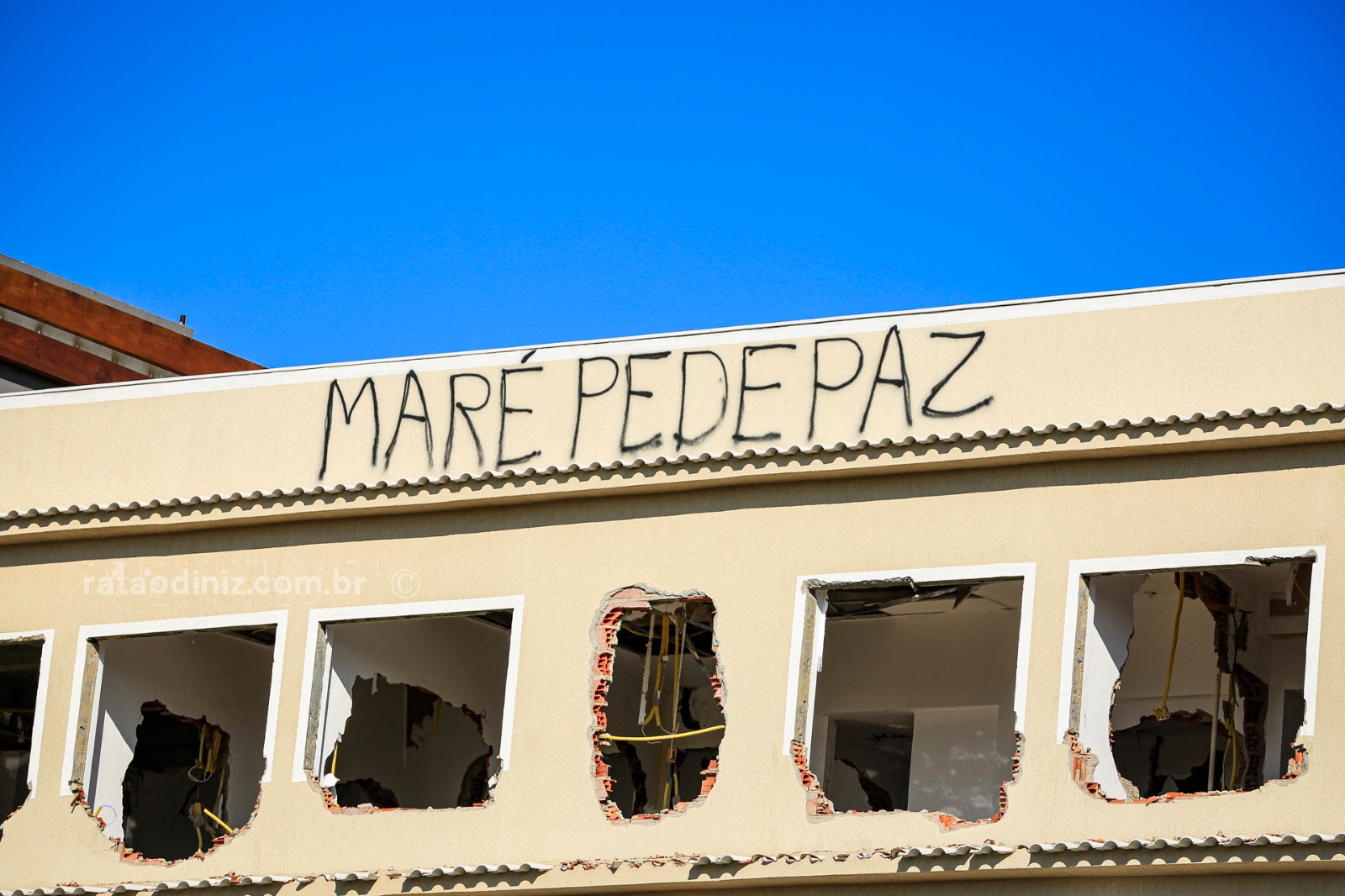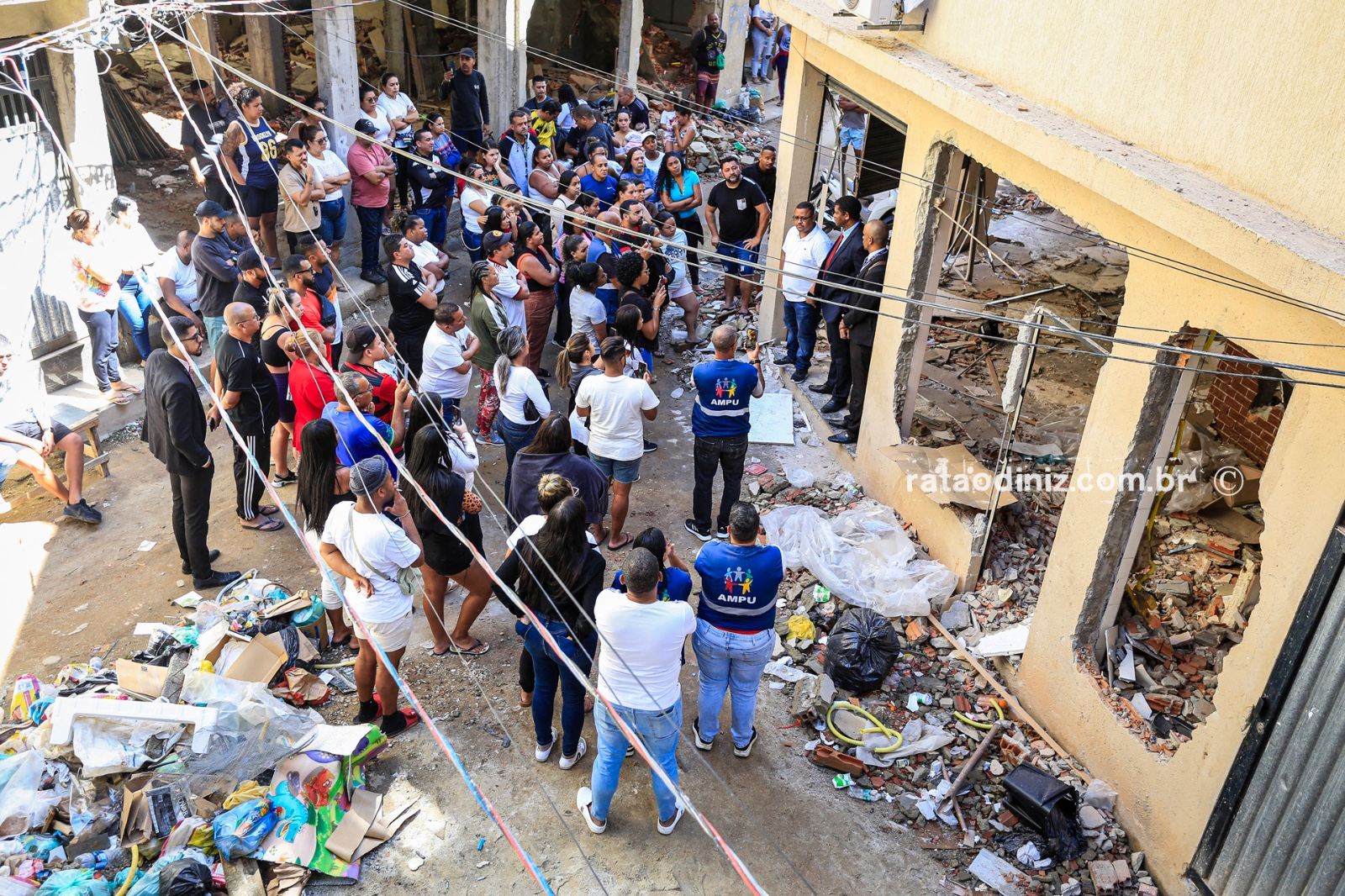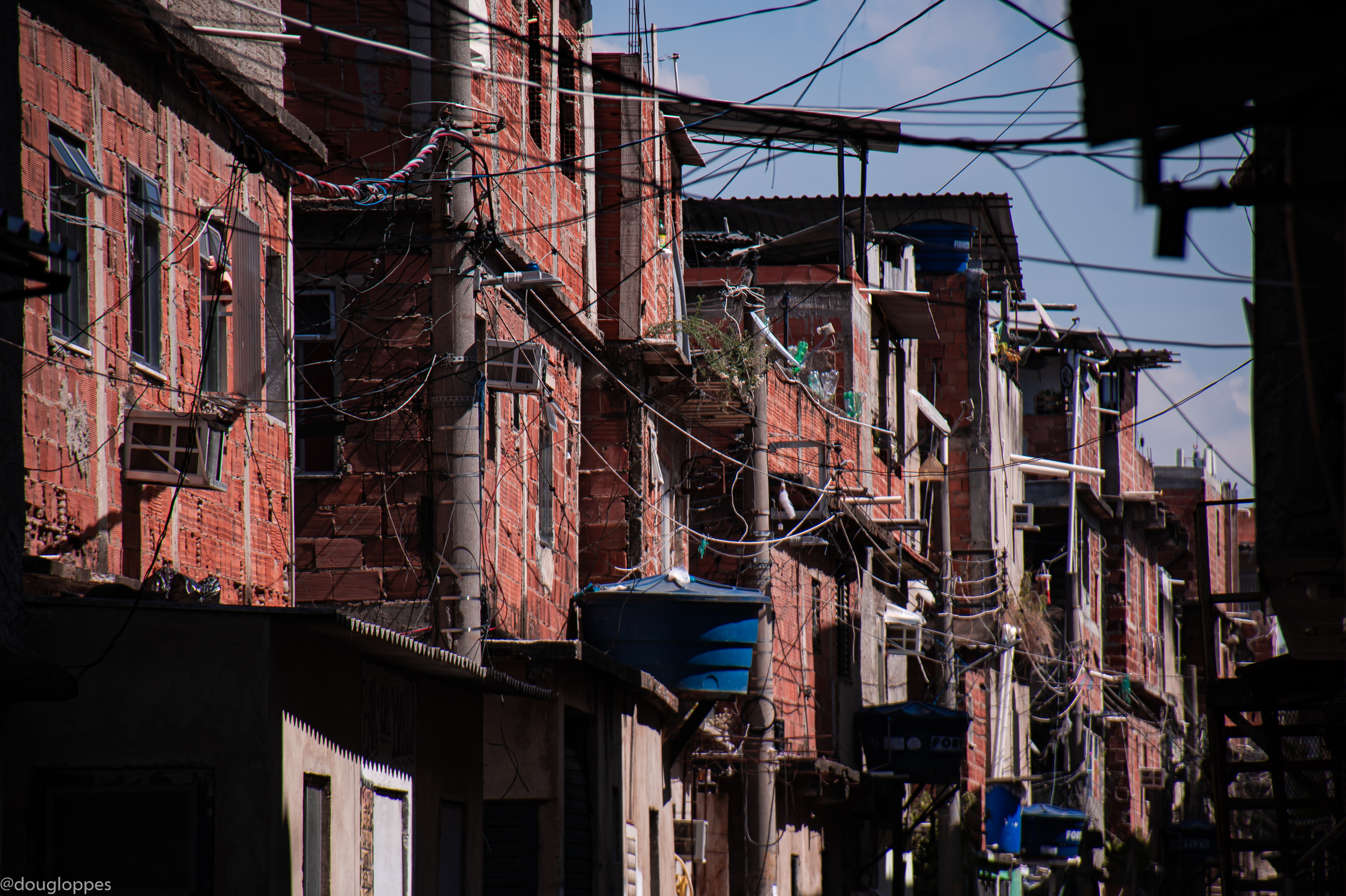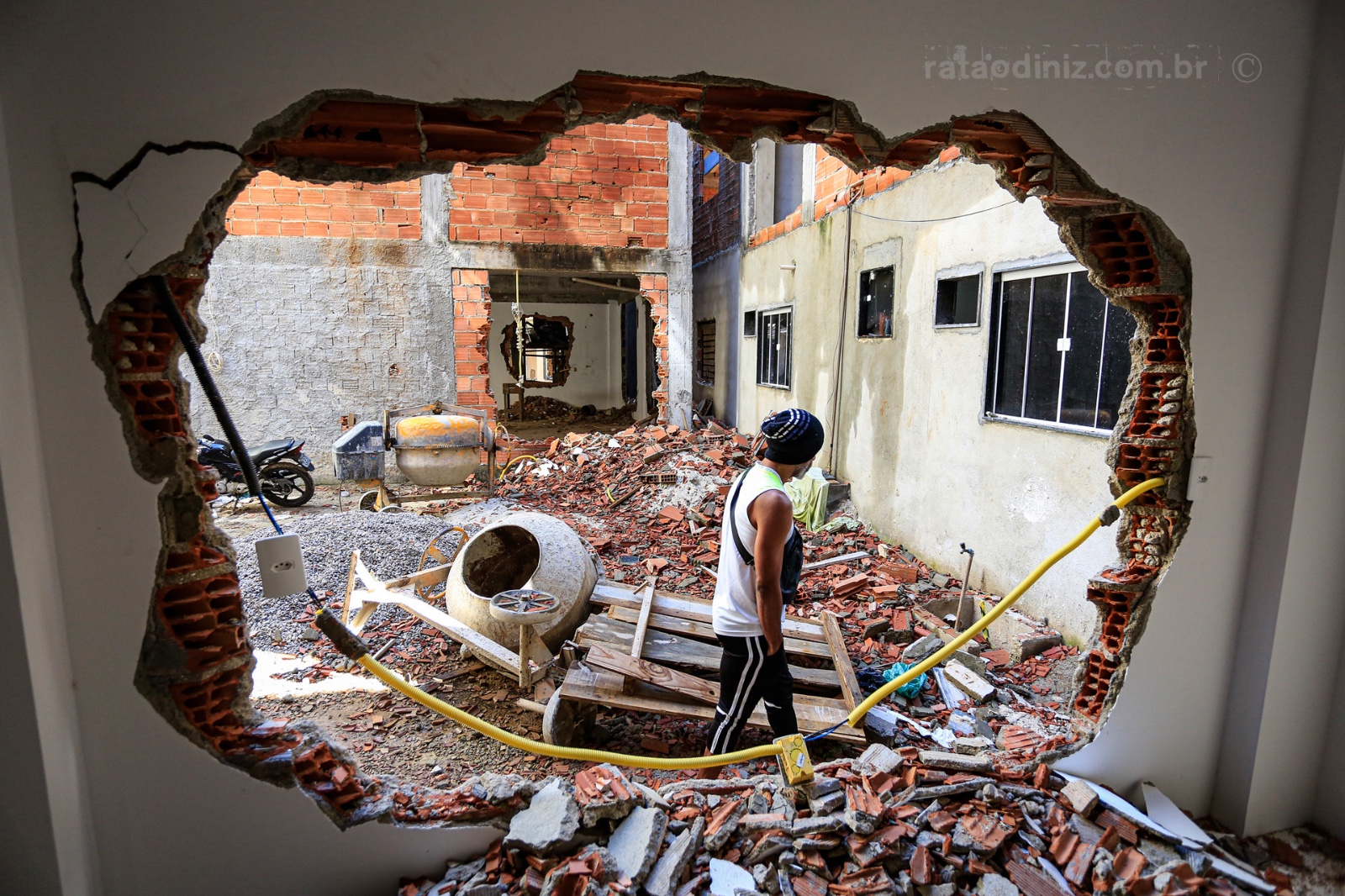
Clique aqui para Português
Imagine waking up on what seems like an ordinary morning, and suddenly being interrupted by the police saying: “Leave your home now, we’re tearing everything down!” Entire families with elders, children, people with disabilities, single mothers—everyone being thrown out on the street without warning, without support, and without direction. This is how, on August 19, families from Parque União, one of the 16 favelas that make up the Maré Complex in Rio de Janeiro’s North Zone, were awakened.
Since then, a resistance movement fighting for the right to housing has gained strength and taken to the streets. Families are refusing to leave. So far, 32 buildings and 162 apartments have been demolished. The police operations that accompany the demolition teams are spreading panic throughout the favela and have led to the closure of 26 municipal schools in the region, leaving thousands of students without class.
On September 3, the 14th day of the operation, three people were killed, and there were reports of residents being tortured, homes invaded, and belongings stolen by public agents. A Transbrasil BRT bus was hit by gunfire. Fortunately, no passengers were injured. Throughout the entire day, hundreds of thousands of lives were put at risk, including residents of Complexo da Maré and those traveling along the major expressways surrounding the cluster of favelas, such as Linha Vermelha, Avenida Brasil, and Linha Amarela.
In total, there have been 14 police operations on consecutive days or very close to one another, focused on Parque União and Nova Holanda, but with police incursions at certain times spreading to other favelas in the complex, such as Parque Maré, Rubens Vaz, Morro do Timbau, Baixa do Sapateiro, Vila do João, Vila dos Pinheiros, and Conjunto Esperança.
The largest federal university in the country, the Federal University of Rio de Janeiro (UFRJ), early-released students and faculty due to the shootings, canceled classes, and temporarily closed its institutes at various points during the weeks of operations. Throughout the day, 38 schools suspended classes. In an election year, residents are denouncing the electoral motives behind the actions of City Hall, the Military Police (PMERJ), and the Civil Police.
A family has been posting in real time. Greice Kelly dos Santos, 23, is the mother of three children, including a one-month-old baby. She and her 17-year-old brother have been widely sharing on social media the abuses perpetrated by the police and the Rio de Janeiro City Hall’s Municipal Department of Public Order (SEOP).
“The chief of police said they would call the Guardianship Council to take away my children because I was exposing them to risks.”
When, actually, it was the Rio de Janeiro City Hall, the PMERJ, and the Civil Police who were exposing her children and the entire population of Parque União to risks,.
View this post on Instagram
Some residents where assaulted by authorities, others had their homes invaded and property demolished while they were out. When they returned from work, they found their homes ransacked, with doors broken down, or, in the worst cases, demolished, with their furniture and belongings stolen or destroyed.
View this post on Instagram
Many Maré residents report that, in addition to losing their homes, they lost their workplaces and feel completely abandoned and wronged.
“I’m a massage therapist. I put a down payment on this home with the money from a moral harassment lawsuit against the company I used to work for. Besides being my home, this is where I treated my clients. I don’t have a safety net in my family, so I had to find my own refuge. Luckily, I found shelter in the favela itself. But [now] I’m completely lost.”

Mainstream media is rife with claims that residents who resisted are criminals or allied with criminals, as the only targeted spaces shown in the media, still under construction, were allegedly built by drug traffickers with high-end finishings like sheet glass, marble, porcelain floors, and swimming pools. However, many of the targeted homes were already occupied. They were part of the same apartment complex and had been sold to working people, families, and people in vulnerable situations. And that is how, through selective images and only partial information featured in the mainstream press, all kinds of violence is justified.
Meanwhile, people organize as best they can through protests, desperately calling for help, which only gains visibility in community media outlets, such as Maré Vive, Jornal O Cidadão, and Maré de Notícias.
Mayor Eduardo Paes has made evictions his calling card, his campaign tool, his fuel for stoking hatred against the poor. Quiet on this front so far during his third term, our pre-Olympic “mayor of evictions” surpasses even Pereira Passos, whose early 20th century administration was famous for widespread evictions resulting in a radical urban renewal that reshaped the city.
In this context, the fundamental rights of favela residents are being violated, disregarding the fact that the right to housing is a human and Brazilian constitutional right. In an election year, prior to what is expected to be his fourth term, the mayor intensifies evictions and benefits from this during the campaign, using the rhetoric of fighting crime and restoring law and order. This is compounded by his image as a “good rogue,” a true Rio native, who kisses women’s hands and makes unexpected appearances at samba events.
In an interview with the community newspaper Maré de Notícias, a 20-year-old resident, living in one of the targeted homes, stated:
“I plan on staying in my home, I’m not leaving, especially because I have nowhere else to go. My kids are still small… School’s out, I have to take her [my young daughter] to the clinic, but there’s no [service].”
In a conversation with RioOnWatch, one of her neighbors shared:
“Five years ago, I had an accident and became physically disabled. My family helped me out. Everyone contributed a little, friends as well, and that’s how I bought my home. I support myself with the Continuous Cash Benefit for People with Disabilities (BPC-LOAS). I have no way of buying another house, and no one, no authority, has offered me a home. I went to the CRAS [Social Assistance Reference Center], and they told me they’d put me in the Minha Casa Minha Vida [federal housing] program, but when will that house be ready? And where? My home was all I had!”
On social media, another resident, a 30-year-old manicurist and beautician, shared with Maré Vive:
“This used to be my shop, my workplace… Just when I thought I’d be working for myself, they come and tear everything down without any warning.”

According to the João Pinheiro Foundation (FJP), there is a housing deficit of 544,275 homes in the state of Rio de Janeiro—the highest since 2016. The report highlights varying degrees of housing inadequacies in Rio de Janeiro. Where is the concern of the State as a provider of rights to ensure the right to housing for these people? A 38-year-old mother of a five-year-old child vents:
“The police showed up putting us down, saying we live in an apartment complex built by criminals. I worked my whole life to save up for the down payment on this house, and I’m still paying the installments, with a lot left to go. Where am I supposed to go now with my son? No one has come to talk to me about social rent or any kind of support. I see it in the news, claiming it’s being offered, but that’s not true!”
Exacerbating this death policy landscape, Governor Cláudio Castro continues the execution agenda widely enforced by his predecessor, Wilson Witzel, whose campaign slogan was the infamous phrase “let’s aim at their little heads and fire!” In the pursuit of this deadly policy, from 2020 to 2024, according to data from publications by Redes da Maré, the residents of Maré have endured over 120 police operations, invariably resulting in deaths, injuries, and the disruption of fundamental rights to health, education, and employment, along with substantial financial losses.
There have also been reports of threats against grassroots communicators from Maré, who covered the operations and episodes of police violence and brutality. This is the case of communicator Caitano Silva, from Parque União, who reported on his Instagram profile that he had been threatened by police officers after posting images exposing State agents breaking into and invading homes and shops in a Maré neighborhood. The video went viral on social media, and shortly after, the police returned to the crime scene, the location where the footage had been recorded, in search of the person who had filmed the illegal actions of the agents.
Since there was a daycare center across from the crime scene, heavily armed police officers stormed the place while it was in operation, with dozens of children inside, and began threatening staff and teachers, pressuring them to reveal who had taken the footage. Residents called Silva to cover this new violation, this time at the daycare. Upon arriving at the scene, he saw dozens of police officers pointing at him and saying: “It’s him!” Witnesses reported hearing officers threaten Silva, saying: “Be careful, your time is coming, you’re in the crosshairs.” The grassroots communicator decided to report the situation on social media as both a form of protection and to document the threats made against him by the police.
View this post on Instagram
This crisis affects Maré’s entire population, especially children, whose rights to education and leisure are being denied. Thousands of children in Maré have missed school due to recent operations, as one manicurist said:
“I live in Nova Holanda, which is nowhere near the area of the evictions, but my daughter’s been home from school for days. Yesterday, they ordered that the schools reopen, but I didn’t send her because there are still a lot of police and armored trucks in the favela. I’m scared she’ll get caught in the middle of a shootout.”
On September 4, Maré woke up without gunfire. Apparently, there would be no police operation that day. Despite the lingering tension in the air, with the possibility of a new operation starting at any moment, schools reopened and some students returned to class.
This disregard for the population is not new. In 2021, during the pandemic, people were evicted from Nova Holanda, and at the time, State forces employed the same modus operandi. The president of the Nova Holanda Residents’ Association at the time, Gilmar Júnior, now explains that, in the case of the apartment complex currently being demolished, there was no notice or notification of any irregularity given by the authorities throughout the entire construction process.
“The residents are desperate because there is no right to social rent or any other social program. Today, they tore down the residents’ dream. It used to be an empty lot with no plans for the area. The [urban] periphery is always left behind. We are outraged!”
The expansion of vigilante militia groups, including through elected political figures, is blatant in Rio de Janeiro. These militias perpetrate anti-democratic practices, such as voter coercion, infiltrate the State, and employ other sophisticated mafia-like strategies to stay in power. The assassination of Maré native councilwoman, Marielle Franco, highlights the strength of these militias and their insatiable hunger for land.

For some time now, real estate exploitation has been growing as one of the main financial arms of organized crime in Rio de Janeiro, whether by militias or drug trafficking factions. The gangs involved in illegal real estate speculation exploit and endanger low-income individuals who are neglected by the State and the formal real estate market, making huge profits and gaining political influence through easy installment plans and accessible payment conditions. For many residents, it is perhaps the only chance to achieve the dream of home ownership.
According to the police, these gangs have come to provide housing for large segments of the population that would otherwise be left without shelter. While banks impose unattainable conditions on low-income and favela residents, militias and drug traffickers make it easier, fueling a lucrative market that has brought increasing territorial and political influence to the gangs operating in Rio de Janeiro. Who loses? The same people who have always lost and been left behind: favela residents, the majority of whom are Afro-Brazilian, and whose right to housing has been systematically denied since the abolition of slavery. For favelas, few options remain: self-construction, collective building through community efforts, or falling prey to gangs looking to profit from the State’s negligence.
*All names of individuals mentioned in the text, all residents of Maré, are fictitious to protect their safety.
